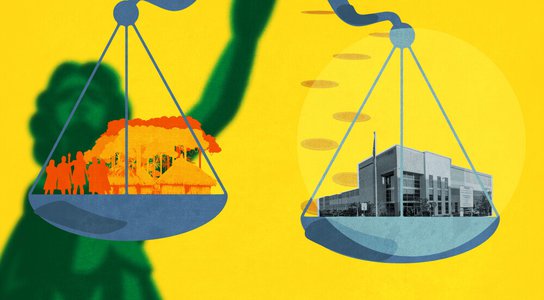Only an ambitious new law can stop EU companies profiting from environmental destruction and human rights abuses such as those detailed in our new report, Runaway Risk.
We found that two Dutch companies are set to profit from a controversial new $15 billion airport project in the Philippines.
To make way for the New Manila International Airport, mangrove forests that protect people against flooding and climate change have been destroyed, and hundreds of families have been displaced. Armed soldiers went door-to-door with representatives of the Philippines developer, San Miguel Corporation, as part of a consultation process, leaving community members feeling “terrified.”
This policy briefing details how a new corporate accountability law could oblige companies operating in Europe to protect the environment and human rights, and help prevent such harms from occurring.
- Download the full briefing (1.5 MB), pdf
Key recommendations
Ahead of negotiations on the European Parliament’s position on the Corporate Sustainability Due Diligence Directive (CSDDD), Global Witness urges MEPs to:
Provide a robust framework for environmental and climate due diligence by
- Including a comprehensive definition of environmental harm that covers all relevant environmental categories. These categories are already set out in the EU’s Corporate Sustainability Reporting Directive (CSRD) and Sustainable Finance Taxonomy.
- Ensuring that companies have mandatory climate due diligence requirements that cover their scope 1, 2 and 3 emissions. These capture emissions that a company produce itself to the ones that result from a company’s indirect activities, such as selling gas, for example.
- Incorporating existing international environmental law standards into the CSDDD, including but not limited to the Paris Agreement, the Ramsar Convention on Wetlands of International Importance Especially as Waterfowl Habitat and the Aarhus Convention on Access to Information, Public Participation in Decision-making, and Access to Justice in Environmental Matters.
- Providing requirements for effective transition plans in line with the Paris Agreement, including science-based targets for short, medium, and long-term emissions reductions.
Ensure adequate stakeholder engagement from companies by:
- Requiring that companies engage with stakeholders regularly, in a genuine and safe manner that accounts for contextual differences and security risks
- Recognising and codifying the rights and vulnerabilities of human rights and land and environmental defenders, including any risk of reprisals.
- Recognising the rights of Indigenous Peoples, including the right to Free, Prior and Informed Consent, as enshrined in the UN Declaration on the Rights of Indigenous Peoples.
- Requiring that companies establish safe, effective, transparent, and accessible grievance mechanisms and conflict mediation procedures aligned with the UN Guiding Principles on Business and Human Rights (UNGPs). These should provide protections for human rights, land and environmental defenders and whistle-blowers and enable provision of swift remedy.


